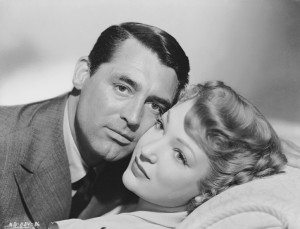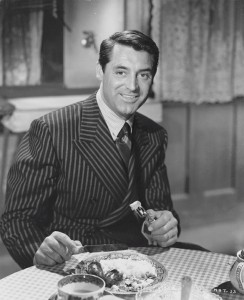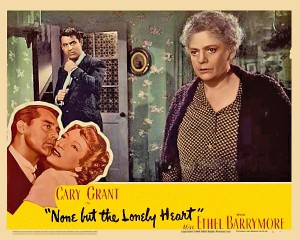When None But the Lonely Heart was released in 1944 by RKO, it was a bit of a flop. Or, as Samuel Goldwyn would say, the crowds stayed away in droves. It was, however, a darling of the critics, garnering four Academy Award Nominations, and winning one – the winner was, of course, Ethel Barrymore as Best Supporting Actress. It was also nominated for score, film editing, and best actor.
And who, may you ask, was the actor in question? Surprisingly, it was Cary Grant in what perhaps was the most uncharacteristic role of his entire career. In fact, the role he plays is more akin to Archibald Leach. In case you don’t know, this is Cary Grant’s birth name. As a youth poor Archie was just that; a poor young lad doing what he could to make it through the day.
 Lonely Heart is and was a true rarity- Cary Grant in a serious role. Not the somewhat lighthearted romantic comedies he had been doing during this period, but rather perhaps the closest Grant came to his most “real” role – here his character is almost tragic in scope. Many have compared this film, and rightfully so, to Nightmare Alley with Tyrone Power which was also released presenting the leading man in a completely atypical role. Unlike Alley, None But the Lonely Heart was released in the hope of some financial gain.
Lonely Heart is and was a true rarity- Cary Grant in a serious role. Not the somewhat lighthearted romantic comedies he had been doing during this period, but rather perhaps the closest Grant came to his most “real” role – here his character is almost tragic in scope. Many have compared this film, and rightfully so, to Nightmare Alley with Tyrone Power which was also released presenting the leading man in a completely atypical role. Unlike Alley, None But the Lonely Heart was released in the hope of some financial gain.
Grant does, in fact give one of his best, if almost forgotten, performances. Ethel Barrymore, although no longer the starlet of her younger years, gives a stunning performance well deserving of the Oscar. Just be warned that this is not your usual lighthearted Cary Grant fare. Rather, this is a rather grim portrayal of the underside of society.
The direction is a bit stuffy, however, and at times the dialogue is a bit overly redundant. At times the plot looses focus and one wonders what exactly the goal of plot actually is – what is director Clifford Odets leading us to?
 Ernie Mott (Grant) has always been just slightly on the good side of the law as he goes through his life. Living in a poor slum he ultimately is torn between the desire for something better and the need to care for his cancer stricken mother (Barrymore). Adding to the conflict is the backstory of the families flirtation with a life of crime. The mother has been a fence and has the chance to fence just a touch more to provide an inheritance for Ernie. Ernie has the opportunity to join a gang and share in its financial gains.
Ernie Mott (Grant) has always been just slightly on the good side of the law as he goes through his life. Living in a poor slum he ultimately is torn between the desire for something better and the need to care for his cancer stricken mother (Barrymore). Adding to the conflict is the backstory of the families flirtation with a life of crime. The mother has been a fence and has the chance to fence just a touch more to provide an inheritance for Ernie. Ernie has the opportunity to join a gang and share in its financial gains.
This one, as you can imagine, does not fit nicely into the Grant filmography and is a bit of a misnomer. Its a good film but not great. Most definitely not deserving of the limited success given it on release in 1944, it also is not meriting great acclaim either.
Just released by Warner Archive in a new “remastered” edition, this version is a mixed bag. Video quality runs the gamut, from crystal clear and crisp to murky and slightly distorted. There seems no rhyme or reason to this variation which is most likely due to the original source material. The audio is fine, just what you’d expect for a picture of this age.
Just take a gander over at The WB Shop.
Review copy provided by Warner Bros. Thanks!
